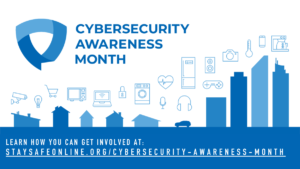October is Cybersecurity Awareness Month
 Today, Oct. 1, marks the kickoff of Cybersecurity Awareness Month (CSAM) across the country. This year’s theme, “Do Your Part. #BeCyberSmart,” emphasizes the role everyone plays in protecting their online lives. If everyone does their part to implement stronger security practices, raise community awareness, educate vulnerable audiences or train employees, our interconnected world will be safer and more resilient for everyone, according to the National Cyber Security Alliance (NCSA).
Today, Oct. 1, marks the kickoff of Cybersecurity Awareness Month (CSAM) across the country. This year’s theme, “Do Your Part. #BeCyberSmart,” emphasizes the role everyone plays in protecting their online lives. If everyone does their part to implement stronger security practices, raise community awareness, educate vulnerable audiences or train employees, our interconnected world will be safer and more resilient for everyone, according to the National Cyber Security Alliance (NCSA).
The NCSA, along with the U.S. Department of Homeland Security (DHS), created Cybersecurity Awareness Month in October 2004 as a collaborative effort to ensure every American has the resources necessary to stay safer and more secure online. Since then, it has grown to include not only consumers, but also educational institutions, small businesses and corporations across the country.
Now, in its 17th year and co-led by NCSA and the Cybersecurity and Infrastructure Agency (CISA), Cybersecurity Awareness Month continues to build momentum and impact. As part of the recognition, individuals and organizations can be recognized as “Champions” for the month and also for online safety and data privacy. Elon is among CSAM’s 2020 Champions!
All month long, the Office of Information Security will offer an array of resources and fun opportunities for faculty, staff and students to learn how to protect personal and university data, while staying safe online. Check out the preview below and be sure to follow us on Facebook, Instagram and Twitter for updates. We’ll use #BeCyberSmart and #ElonSecure to keep you informed.
A Preview: Cybersecurity Awareness Month 2020
Throughout October, we’ll join the NCSA in focusing on the following weekly topics.
Oct. 1 – 2: Official Kickoff
We invite you to participate in Cybersecurity Awareness Month 2020 as we encourage all users to “Do Your Part. #BeCyberSmart” in owning their role in protecting data and connected devices.
October 5 – 9 (Week 1): If You Connect It, Protect It
The first week will highlight the ways in which internet-connected devices have impacted our lives and empower all users to own their role in security by taking steps to reduce their risks.
October 12 – 16 (Week 2): Securing Devices at Home & Work
Week 2 will focus on steps users and organizations can take to protect internet connected devices for both personal and professional use.
October 19- 23 (Week 3): Securing Internet-Connected Devices in Healthcare
In this era of COVID-19, the third week will delve into the industry (hospitals, care facilities) and consumer (telemedicine patients) implications of internet-connected device use and what steps both can take own their part and #BeCyberSmart.
October 26 – 30 (Week 4): The Future of Connected Devices
In the final week, CSAM will conclude with a look at how technological innovations, such as 5G, might impact online experiences for consumers and business (e.g. faster speeds and data transmission, larger attack surface for hackers), as well as how people/infrastructure can adapt to the continuous evolution of connected devices moving forward.
Get Started Today
Start the month off right with these best practices to help you protect yourself, the university and our community. Visit the Information Security website for more details.
- Sign Up for Information Security Alerts: Spear phishing, phishing, ransomware and other electronic communication scams are pervasive at educational institutions. Sign up for Information Security Alerts to stay informed of the latest cyber threats and phishing schemes and learn more about these types of attacks on the Information Security website.
- LastPass: Only you should know your passwords. Elon University will NEVER ask for your passwords by email, phone or in-person. To assist all students, faculty and staff with managing an increasing number of passwords, we offer LastPass, an industry leading password manager. Visit LastPass to sign up for your account.
- Antivirus Protection: Information Technology enabled Microsoft Advanced Threat Protection (ATP) and notifications of quarantined items to improve spam and junk message handling for all faculty and staff email accounts. Users receive daily notifications for any messages received that are classified by Microsoft as junk and held in quarantine for review. If a valid email is held in quarantine (not junk), a user may release it to their inbox. Read more about ATP in our IT Knowledge Base.
 Follow
Follow